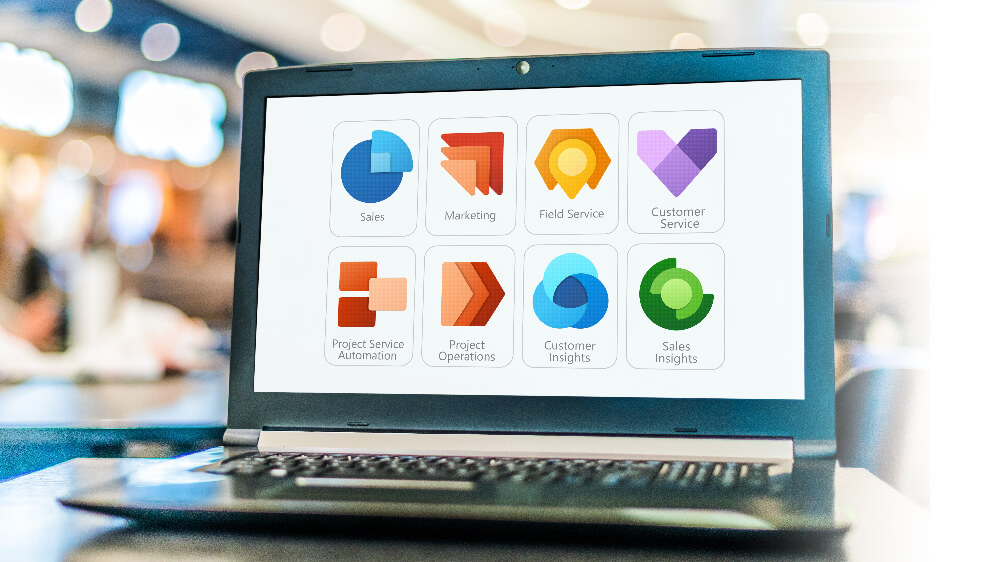According to Forrester, the marketing automation technology industry is expecting global spending on marketing automation platforms to surpass $25 billion by 2023, implying a 14% annual growth rate. That could be because the businesses in this new-age digital world find it hard to consolidate and seamlessly integrate customer data across multiple departments, numerous product line categories and different geographic locations. On top of it, it becomes even harder to work on customer experiences, have personalized journeys for each customer and retain them in the future with more engagement resulting in increased sales for the business.
A few key themes have emerged that will drive growth of Dynamics 365 Marketing over the next five years:
- Spending on marketing technology is increasing. According to Forrester, 55% of global marketers plan to increase spending on overall marketing technology next year.
- Personalization enhances customer experience and is now the norm. Customers are rewarding firms for personal, relevant, and value-added individualized experiences. As personalization becomes the standard, consumers now expect this level of engagement across channels and digital touchpoints. Marketing automation platforms and technologies can help marketers scale their personalization efforts.
- Artificial intelligence is transforming marketing. We are in the early innings, but AI is playing an increasingly important role in marketers’ ability to leverage data. Effective use of AI tools in conjunction with marketing automation technology will drive a lift in marketing performance. Multiple marketing technology vendors now utilize AI to improve their predictive capabilities.
Data-driven decision-making and optimization of business value among all organizations have become a critical differentiator in the marketplace. Organizations strive to deliver the best for their customers as the new-age millennial or Gen-Z customer is looking for the very best in products and wants optimal and efficient service to be delivered. It is important to adopt a result-oriented approach to cater to the changing trends of the marketing methodology and reap the benefits of marketing automation. Marketing automation software facilitates an organization to reach goals aligned with its needs. New leads are the key to marketing as the old ones expire with time. Email open rates are trending now, and so are priority inboxes, as customers can tune out the emails they do not find relevant.
According to Gartner’s Magic Quadrant Report for Marketing Automation Platforms in 2021, Microsoft has been named a Challenger among all the products available in the market. Microsoft Dynamics Marketing as a product provides multichannel marketing automation and is part of the wider Dynamics suite comprising sales, service, commerce, and the Customer Insights CDP. Dynamics integrates with Microsoft’s Power Automate workflow process builder, the Power BI analytics platform, Office and Teams for collaboration. It also adds deeper personalization capabilities and incorporates AI-driven insights into journeys.
Microsoft with Microsoft Dynamics 365 Marketing has been innovating and redefining itself in building a perfect B2B marketing application that is not only helping customers but also businesses in enhancing their growth. Let’s look at some of the strengths that Microsoft Dynamics Marketing has, compared to other products in the marketplace.
Strengths of Microsoft Dynamics 365 Marketing
Microsoft Gartner lists out the strengths of the Dynamics Marketing application when compared to other CRM products. Some of them include.
- Ecosystem: Microsoft AppSource offers different marketers a rich and diverse ecosystem of add-on product capabilities & implementation partners. In addition to the wider Microsoft environment of Office 365, Power Apps/Automate/BI and the underlying infrastructure platform and services, Microsoft Azure provides a robust environment for organizations of any size to manage the prospect and customer experience. The Microsoft Marketing application can leverage the use of these Microsoft products and extend the application’s capabilities and cater to the complex demands that users may have.
- Innovation: Microsoft provides transparency into its overall roadmap for Dynamics 365 Marketing and has invested significantly in the product in recent years. The August 2021 release of customer journey orchestration capabilities allows real-time personalization and engagement. Microsoft has also integrated Dynamics 365 Marketing with Microsoft’s Teams collaborative software. For customer journeys, one can now create journey branches based on any attribute associated with the customer or event trigger that started the journey. It has also enhanced the Event Feature on the Dynamics Marketing application.
- Customer Insights: Dynamics already operates from a common data model (Dataverse), facilitating marketer access to sales and service data across Dynamics applications. The Customer Insights CDP, a separate add-on module, enables marketers to unify other customer data to build rich customer profiles. This data is available throughout the product to provide insights, predictions, and activations. Marketers can use marketing automation platforms to personalize the messages or content they send to leads. They can also schedule messages and automate common responses. For businesses with a large customer database, these tools can greatly increase the productivity of sales and marketing teams.
Key Features of Dynamics 365 Marketing
1. Customer Journey
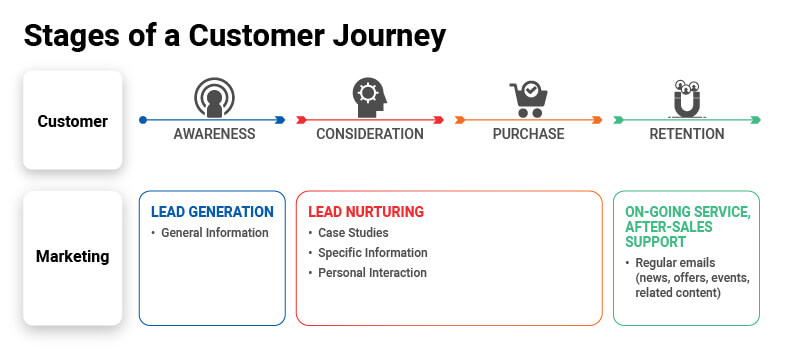
A customer journey is an automated marketing campaign for a specific segmented target audience. It helps send personalized email messages, schedule all the follow-up activities for the sales team, trigger workflows, and execute campaign-based activities.
The image below is a simple illustration of a customer journey that sends an email to city-based segmented contacts. Based on the action taken by the contacts, it either creates a lead on the CRM application or sends another marketing email.
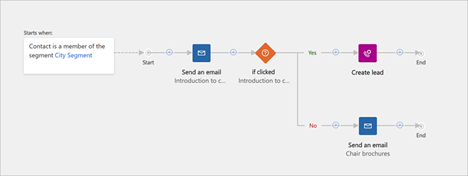
2. Email Marketing
Emails can be an important marketing medium for all new-age companies. Dynamics 365 Marketing can send large volumes of personalized marketing emails, monitor how each recipient interacts with them, drive customer journey automation based on these interactions, and present results for individual contacts with aggregate statistical analytics. Emails in Dynamics 365 Marketing are implemented through customer journeys.
We can also preview emails on multiple devices like smartphones, tablets and desktop devices using the preview feature.
In the example below, a welcome email is being sent from Hexaware.
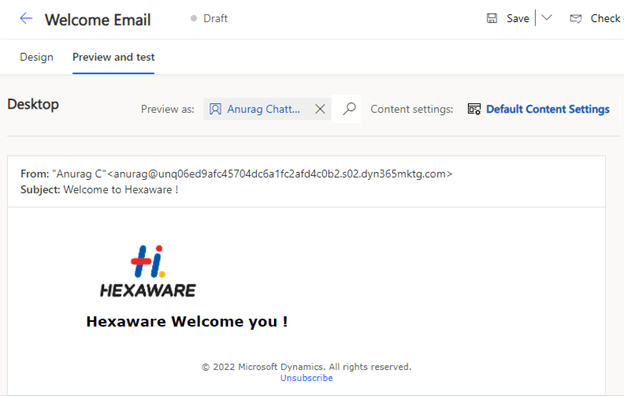
3. Customer Segments
Customer Segments are those contacts that we filter out based on certain criteria based on demographic, firmographic, behavioral data, and other considerations.
Customer Segments are used mainly in customer journeys. But they can also be used in Lead Scoring, Marketing Insights and Email Marketing.
In the example below, I create a segment of all Hexaware Employees based in the City of Mumbai and then add a query block and filter the city address of all contacts.
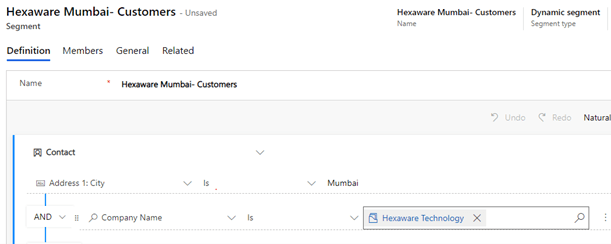
4. Marketing Events
Dynamics 365 marketing helps in scheduling events and all the processes, including initial planning and budgeting through promotion and publication, attendee registration, webinar broadcasting, final analytics, lead generation, and evaluation of ROI.
You can this feature to manage the following:-
- Venue, Buildings, rooms, and room layouts
- Guest Logistics – Room Allocation and Reservation
- Tracking sponsors and their sponsorships for each event
- Organize events in a seamless manner
Down below is in an example of Hexaware conducting a webinar session.
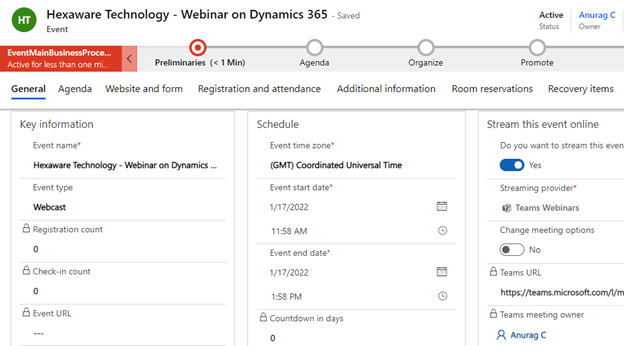
5. Lead Scoring Model
In order to make a contact sales-ready, this feature is used to calculate a score for each lead, based on demographics, firmographic details and the action taken by each contact on the respective feature of Dynamics 365 Marketing. The scorable interactions can be opening an email, submitting a landing page, visiting your website, or attending an event.
As shown below, we can set up a lead scoring model based on certain conditions and then have points based on the action taken by the respective contact.
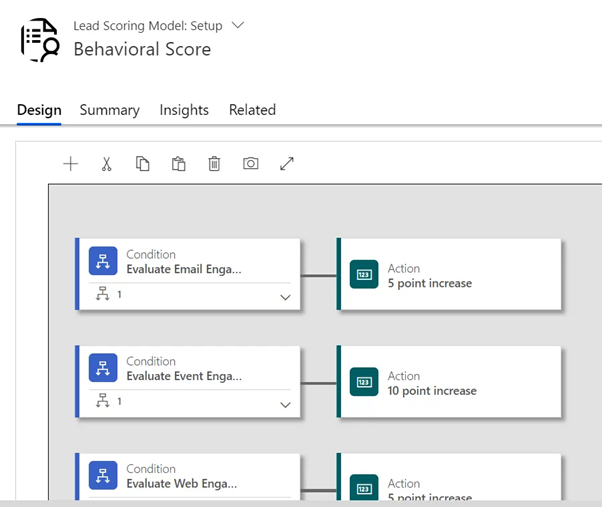
There are other salient features on D365 Marketing like the Marketing page and Marketing forms that can be used in marketing emails and marketing events. They act as landing pages that capture important information if someone registers for an event or sends information via a survey.
Conclusion
Dynamics 365 Marketing is an extremely useful tool for businesses and they can benefit from
- Improved marketing strategies and seamless integration with Microsoft products
- Increased customer engagement and increased loyalty as a result of personalized customer journeys
- Key insights and customer feedback that helps in enhancing the marketing strategies of the business
- Use of third party integrations that expand the capabilities of the application
Microsoft Dynamics 365 Marketing can be easily customized to fit your specific business needs. You can create basic customizations by using tools that are built into the app. We can also expand its capabilities by adding new feature and installing third-party packages to fulfil the customer’s specific needs.
Sign up for your marketing automation journey by clicking on this official link for Dynamics 365 for Marketing and get started.







